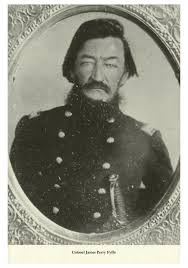I've been doing a bit more cursory research into a duel that took place between James P. Fyffe and Carr B. White, two gentlemen buried in the same cemetery in Georgetown, Ohio. This duel is fresh on my mind as I told the story at the 59th Ohio monument to two of my friends on the recent trip to Shiloh. I have come across two stories about the duel, well, actually it is mentioned in several places with little to great detail. I will relay the crux of the most detailed story here.
Both men were from the same area in southwestern Ohio, and both joined the 1st Ohio Infantry during the Mexican-American War. White served as Second Lieutenant in Company G and was promoted to Captain in February, 1847. This promotion created bad blood between White and Fyffe, who was also serving in Company G. The misunderstanding grew to such a level that Fyffe issued a "challenge to mortal combat" to which White accepted immediately. James F. Harrison, grandson of former president William Henry Harrison, acted as Fyffe's second, and Ferdinand Van Derveer, later colonel of my home county's Civil War regiment, the 35th Ohio Infantry, was White's second. The two seconds tried to diffuse the situation, to no avail. The duel had to be put off until after the 1st Ohio mustered out, as Zachary Taylor, commanding the force the 1st Ohio was a part of, made it clear that dueling would not be tolerated. The duel would not occur in Mexico, although one story stated that it did.
On May 17th, Van Derveer informed Harrison:
Dear Sir, - In accordance with your request, I hereby give you, in writing, a statement of the preliminary arrangements entered into between you and myself concerning an affair wherein Lieutenant Fyffe and Captain White are the principals. Time, 1st of June; eight o’clock in the morning. Place, battle-ground below New Orleans. Weapons, pistols. Distance, fifteen paces. Any alterations may be made by the consent of both parties.
It is interesting to me that the location chosen was the site of the Battle of New Orleans. However, once again the movement of the regiment prevented the duel from taking place on Old Hickory's victory site. As the regiment moved north along the Mississippi River, the steamboat on which they were being transported stopped to take on wood along the Arkansas shore and that taking on fuel would be a two hour process. It was decided to conduct the duel during this lull. At daybreak, June 10th, Fyffe and White met in a cotton field to settle their differences. Harrison had taken ill, so Fyffe's second was taken by Lieutenant James Moore. Neither White or Fyffe had fought a duel, and Fyffe did not even have a pistol. White had slipped into New Orleans two purchase a pair of long dueling pistols, and he allowed Fyffe to use one of his pair. With pistols loaded, the men facing each other only twelve paces apart (a change from the original terms), Fyffe's back to the Mississippi, and with the sun at his back, his outline was silhouetted in the morning sun. With their right sides facing each other, Van Derveer counted out "one, two, three - fire!" and both men fired, and missed. The shooters were convinced by the interjection of others present that honor had been served, and the two men shook hands after both explaining and making concessions on their respective positions.
One story mentions that men from the regiment were straining to see the duel from the steamboat, but could not due to the distance the and vegetation along the shore. The story goes on to mention that after waiting what seemed to be a frustrating amount of time, the two men were seen walking back to the boat, arms draped over each other's shoulders.
This much is known: Fyffe opened a law practice in a building that was owned by White in Georgetown, so the men must have been on friendly terms. White would go on to have his own successful Civil War career in the 12th Ohio, while Fyffe died in January, 1864, after battling a long illness said to have been contracted at Shiloh.

No comments:
Post a Comment